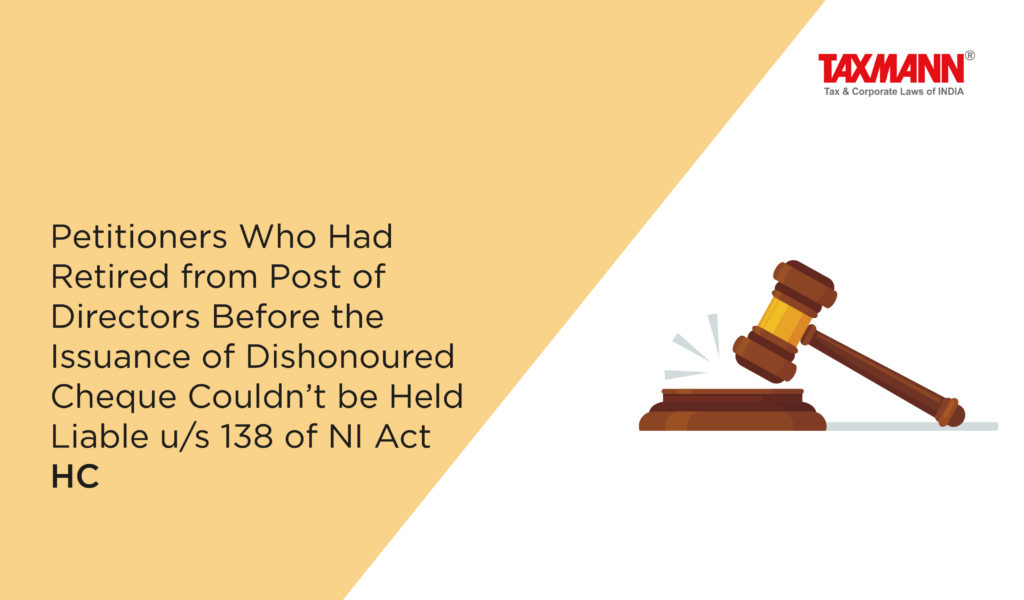Petitioners Who Had Retired from Post of Directors Before the Issuance of Dishonoured Cheque Couldn’t be Held Liable u/s 138 of NI Act | HC
- Blog|News|FEMA & Banking|
- 2 Min Read
- By Taxmann
- |
- Last Updated on 18 September, 2023

Case Details: Pankaj Saraf v. State of West Bengal - [2023] 153 taxmann.com 647 (HC - Calcutta)
Judiciary and Counsel Details
-
- Bibek Chaudhuri, J.
- Dipanjan Chatterjee, Ashok Bhowmik, Ms Richa Pramanik & Sourodeep Singha, Advs. for the Petitioner.
- Debajyoti Deb, Shyamal Mondal, Ms Somdyuti Parekh & Ms Sanjana Maitra, Advs. for the Respondent.
Facts of the Case
In the instant case, ‘D’ company issued three cheques in favour of the complainant company but the same were dishonoured on presentation. Thereafter, the complainant issued a notice upon ‘D’ demanding the due amount of cheques within the statutory period of time.
However, ‘D’ failed to pay the due amount and, thus, a complaint under section 138 of the Negotiable Instruments Act, 1881 was filed against ‘D’ and the petitioners (i.e. directors of ‘D’).
The petitioners filed an instant writ petition for quashing the complaint registered under the NI Act on the ground that they retired from the post of directors of ‘D’ by submitting their resignations before the Ministry of Corporate Affairs on 10-6-2014 and the cheque was issued on 21-6-2014. Therefore, the petitioners were not directors of the company on the date when the cheques were issued.
High Court Held
The High Court held that since the petitioners were not directors of ‘D’ on the date when the cheques were issued, they could not be held liable under section 138 of the Act and, thus, the criminal proceedings initiated against the petitioners could not survive.
List of Cases Reviewed
-
- Fateh Chand Bhansali v. Hindusthan Development Corporation Ltd. [2005] 2 CHN 454
- Saroj Kumar Jhunjhunwala v. State of West Bengal [2007] 1 C Cr. LR (Cal.) 793 (para 12) followed.
List of Cases Referred to
-
- Harshendra Kumar D. v. Rebatilata Koley [2011] 9 taxmann.com 229/106 SCL 159 (SC) (para 5)
- Vijay Chaudhary v. Gyan Chand Jain 151 [2008] Delhi Law Times 237 (para 6)
- Saroj Kumar Jhunjhunwala v. State of West Bengal [2007] 1 C Cr. LR (Cal.) 793 (para 7)
- Counter Point Advt. (P.) Ltd. v. Harita Finance Ltd. 2006 (2) Crimes 368 (para 9)
- Fateh Chand Bhansali v. Hindusthan Development Corporation Ltd. [2005] 2 CHN 454 (para 10).
Disclaimer: The content/information published on the website is only for general information of the user and shall not be construed as legal advice. While the Taxmann has exercised reasonable efforts to ensure the veracity of information/content published, Taxmann shall be under no liability in any manner whatsoever for incorrect information, if any.

Taxmann Publications has a dedicated in-house Research & Editorial Team. This team consists of a team of Chartered Accountants, Company Secretaries, and Lawyers. This team works under the guidance and supervision of editor-in-chief Mr Rakesh Bhargava.
The Research and Editorial Team is responsible for developing reliable and accurate content for the readers. The team follows the six-sigma approach to achieve the benchmark of zero error in its publications and research platforms. The team ensures that the following publication guidelines are thoroughly followed while developing the content:
- The statutory material is obtained only from the authorized and reliable sources
- All the latest developments in the judicial and legislative fields are covered
- Prepare the analytical write-ups on current, controversial, and important issues to help the readers to understand the concept and its implications
- Every content published by Taxmann is complete, accurate and lucid
- All evidence-based statements are supported with proper reference to Section, Circular No., Notification No. or citations
- The golden rules of grammar, style and consistency are thoroughly followed
- Font and size that’s easy to read and remain consistent across all imprint and digital publications are applied



 CA | CS | CMA
CA | CS | CMA
